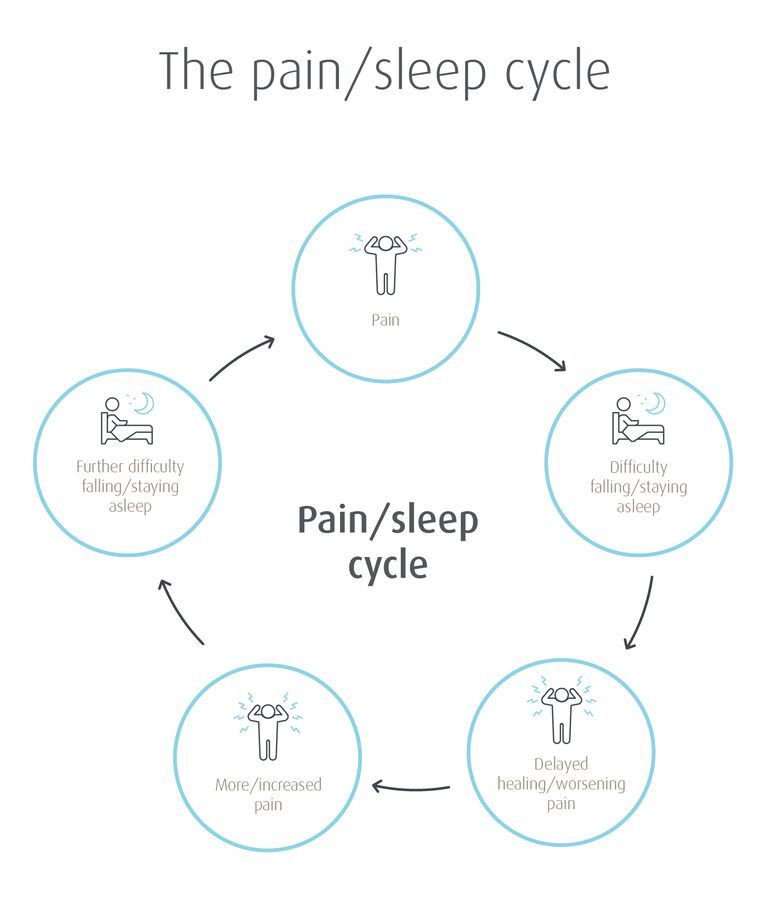Sleeping with pain: 6 things you should know

The relationship between pain and sleep is complex. They have a reciprocal relationship – meaning pain can cause poor sleep, and poor-quality sleep can slow down healing or make your pain worse. This can unfortunately mean people struggling with pain find themselves in a continuous pain/sleep cycle, with their lack of sleep and pain worsening over time.

How does sleep affect pain? A good night’s sleep can leave you feeling refreshed, so it makes sense that poor-quality sleep can negatively affect our health. Research shows that insufficient sleep can lower pain thresholds, delay recovery from injuries and exacerbate pain.
If you’re struggling with chronic pain, these effects can be even more pronounced. For example, in patients with fibromyalgia, a poor night’s sleep leads to greater pain the next day. On the other hand, research also shows that improved sleep leads to decreased pain in fibromyalgia patients. So you see, the importance of good quality sleep continues to play a huge part in our health.
The pain cycle - Which comes first? Pain or poor Sleep? Sometimes it’s easy to identify which came first – pain or poor-quality sleep. For example, you may have suffered an injury and found that led to sleep struggles.
However, it can sometimes be more complicated to work out which is the cause, with experts comparing it to a ‘chicken or egg’ scenario. However, it can sometimes be more complicated to work out which is the cause, with experts comparing it to a ‘chicken or egg’ scenario.
The good news is that experts agree it is possible to break the sleep/pain cycle. If you’re regularly not getting enough sleep due to pain, it’s important to speak to your doctor to see if your condition is being managed properly. They may also be able to recommend some treatments or exercises that can help.
Improving your sleep hygiene can help give yourself the best chance at a good night’s rest. Some recommended sleep-promoting behaviours include:
Spending time out and about during the day
It’s important to get out and about during the day, while it’s light. This helps reset your internal body clock. Then, at night, the darkness will make you feel drowsy and ready for sleep.
Avoiding food, caffeine and alcohol before bed
Food triggers digestion which can keep you awake. It’s advisable to eat at least two hours before bedtime. You should also stay away from caffeinated drinks and alcohol if you’re having trouble sleeping.
Avoiding screens before bed
Avoid watching TV or using your phone before you go to sleep and instead do something that will relax your mind and muscles, like taking a hot bath. Or you can start a ritual that you start to associate with sleep, for example reading a book or doing some relaxation techniques.
Sticking to a routine bedtime
Go to bed and get up at roughly the same times each day. Getting up at the same time is particularly important as it helps reset your inner clock.
Getting up if you’re struggling to sleep
Getting up and out of the bed is better than lying awake for hours. This prevents your brain from associating your bed with lack of sleep.
Investing in the right mattress and bedding
You should ideally be spending around 8 hours a night in your bed, so you need to ensure it’s comfortable and suits your needs. Speak to a mattress specialist and find the one that’s right for you.
If you are wondering how can a TEMPUR® mattress help you get a better night's sleep? TEMPUR® Material was originally developed for medical purposes and some forms of our Material have been clinically proven to relieve pressure points on the body, enabling several of our products to be CE-marked as medical devices in the EU.
The material’s super adaptive properties ensure your entire body is evenly comforted and supported. By reducing pressure points, TEMPUR® Material also helps to reduce tossing and turning at night, meaning you’re less likely to twist your body into a position that could cause pain, stiffness and discomfort, and helping you get the deep, restorative sleep you need to help your body recover.
Feel it for yourself
Find a TEMPUR store or Stockist and try out our range of mattresses for yourself

SIGN UP FOR THE NEWSLETTERS!
By signing up, you agree to receive TEMPUR Singapore’s products, services, news, reviews and promotions by emails. For more information on how we process your personal data, please refer to our Privacy Policy.





